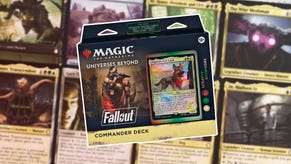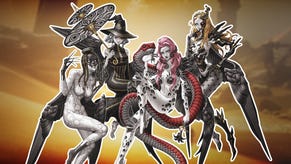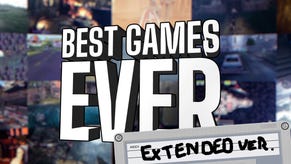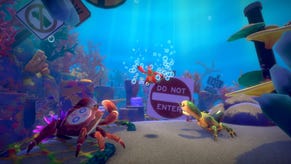I'm Running as Fast as I Can: Inside Summer Games Done Quick
Every year, the world's best speedrunners gather to play games in ways you've never seen before. It's not just a great time—it's also for a great cause.
This article first appeared on USgamer, a partner publication of VG247. Some content, such as this article, has been migrated to VG247 for posterity after USgamer's closure - but it has not been edited or further vetted by the VG247 team.

What Makes a Good Speedrun?
Grant: [Speedruns need] to be interesting in either a very obvious way, or a way that you can explain. I think [Japanese RPGs are] the worst for this, because they’re not obviously interesting if people don’t know the game. That’s why Earthbound, Chrono Trigger, and Final Fantasies do a lot better than Legend of Dragoon. I know there are Legend of Dragoon speedrunners. I played that game. I do not see how—I could not run [it for] 14 hours.
2dos: I believe the ideal game, from an audience perspective, is one that is very, very broken. I think Donkey Kong 64 really falls in that category. Crazy Taxi, not quite so much. I mean, it goes fast, but it’s not really a broken game. Although, going fast [is appealing to the audience] as well, but I think the more broken games are even more appealing to an audience who is interested in just speedrunning.
Turpie: I think from a viewer perspective, there’s a few things involved. I think as a viewer, you want to watch a game that you are already familiar with, even casually. So, for example, if I played Zelda, I would be more willing to watch a Zelda run, then, say, Final Fantasy IV, which I may not be familiar with. So, it kind of just depends on what game you just know, because if a game is broken or not, you can still play it just quickly. If you aren’t familiar with a game it’s very hard to follow.
The other thing which is kind of weird is that, if you’re running a speedrun, if you have a game that’s just continuous action, say, like Castlevania, there’s really no downtime for the runner, so you can’t really interact with the chat at all. So it’s really just focused on the speedrun for the twenty minutes or so, and I think from the viewer aspect it’s a little detrimental. But, even if a game has a lot of breaks, like loading, stuff like that, the speedrunner can interact with the chat at every loading zone, and it helps a lot.
2dos: I definitely think, generally, the longer the run, the harder it is for people to sit down, watch, and enjoy. But, this is from my personal experience, I do get more viewers in my channel in the longer categories, but I think that’s just because people turn on the channel and do other things, not necessarily watch the whole time, but do chores or something. That’s just an example.
Turpie: From a speedrunner’s perspective, I think the number one thing you should be looking for is a game that you really just really enjoy. Above anything else, it’s a game that you’re going to be putting thousands of hours into—you keep playing it over and over. If you don’t love the game, you’re going to really hate yourself by the end. So, that’s the most important. Things like good music will also help keep you going, because if it’s got a really bad song that loops a lot, then you’re going to drive yourself crazy. But, yeah, generally, I think from a speedrunning perspective, you try to want to get a game that’s very technical and has a lot of skill so you can show it off, but not super exhausting, not very repetitive.
Thorne: For somebody who’s viewing it, [a good speedrun is one] that shows off good tricks... especially [for those] new to speedrunning. They’re like, “What do you mean, you go fast? Like, how did you use that glitch? What just happened?” Like, in Mega Man 2, for example, you can zip into walls, which makes the game much much faster.
But, as a player, that kind of varies between person to person. I’ve noticed that the games I ended up choosing actually have a lot going on with them, but you don’t actually know that without having run the game yourself. Like, Mega Man 6, you look at it, and there aren’t any big tricks in it, like Mega Man 2 [has]. [In] Mega Man 2 you can zip into the wall. [In] Mega Man 6, that actually kills you if you do that. So, everything that happens with Mega Man 6 is very "micromanage-y."
[In] Mega Man 6 you can’t jump out of a slide like you can in 3, 4, and 5, so the main thing that you’re doing in Mega Man 6 is getting your slide chaining as perfect as possible, you know, just from one slide to another, and because you can’t jump out of a slide, we have slide cancelling instead. So, I have to try and manage the cancels as fast as I can to actually jump quickly. So, stuff like that ended up being a lot of the stuff that I do. I know for a lot of other people, they choose games like Ocarina of Time, that have a lot of huge tricks in them, for example.

Running the Show
Turpie: At Games Done Quick, I’m the tech coordinator. So, a lot of what I do is the planning and preparations that are involved in the tech aspect. A lot of that is figuring out what resources need to be bought and how things are connected, and just the general layout, all the routing and stuff. And then, after that, a lot of my role is the actual set up and making sure things aren’t on fire.
Grant: I kind of putter around a bit. I was handling a lot of the event and all the interviews—that's what I did this time around. I also did all the media relations, so just sending out information to the press, responding and setting up people like yourself at the event to make sure that they get here and see some of the cool stuff that they might not know about, just walking in.
Turpie: I don’t think we really consider ourselves professionals, but we do this year after year. And generally, the way things have gone is, what needs to be done, what do we want to get done, and we’ll start wrapping things up, sketching on paper, because now we use the Internet and stuff. But, every year, we have this new idea, and we try it out, and it might fix some problem, but it always introduces some new problem, and we’re constantly trying to fix it, and the system gets more and more complicated every year.
I think at this point, we have this point where we’ve stabilized, I think we’ve reached something that is good, but, that’s kind of how things go. We have this design and this plan period, and then at the event have this test period, basically, and then we go back to the drawing board, and we just keep building this system up.
Grant: The scheduling has been a little bit off, I think, since last November. The way it’s supposed to work is as one event starts, we’re starting preparation for the next event. So, for SGDQ 2015, we should have had a few things locked down by December, but the organizer for AGDQ was sick, so we actually had to play some catchup, and that’s thrown us off since then. So, in general, as one event is starting, preparation for the next event should already be well underway. At least, talking to hotels, making sure we have a location that will fit the next event. Because that has been a problem with a lot of hotels, is, Yeah, they fit us once, but can they fit us with an extra 300, 400, 500 people?
Turpie: I think [Games Done Quick's growth is] overall a good thing. I think you go to these events, but what purpose you go to these events might be a little different. A lot of people definitely will still always go to them to meet their friends and use the event as kind of a meet-up time, but I think there’s a certain point where we’re going to just not going to be able to grow anymore, because I think there’s no intention to move to a convention level center, and I think we’ll always just be in a singular hotel. I mean, the plans might change in the future, I don’t know, but it kind of restricts us. Even with the largest hotel, I don’t think we could possibly get above 1500 or 2000 people. Which, I guess means that, I feel like, what we’re at now, is kind of the end result in some ways, but it’s hard to look down the road ten years and see how things have changed, because, if you asked me, like, two years ago, I would have never thought we’d get this big.
Grant: There’s just a lot more people, just watching, attending, talking about it. That’s kind of been the biggest one, because the first event I attended had 130 people. It was over 100, but not by much. And that was SGDQ 2013. SGDQ 2015 had 1200, AGDQ had about 1100, and the numbers is the crazy part. You know, 100,000 viewership, millions of dollars in donations now for both events—every number has gone up, essentially.
And additionally, while that’s happened, a few things haven’t changed. Chat was bad before—chat is still bad today. But stuff like the community feel, for 1200 people, I still hung out with a lot of the people that I normally do. I still saw them. And, it was not like this massive gathering. It wasn’t like a con, where you kind of see a few people for a few seconds and that’s that. I think because the event is still so long, it still felt like a relatively small event. I still got to hang out with people that I knew quite a bit.
The Speedrunning Community
Thorne: As a whole, I think everybody [in the community] works cooperatively. There’s always a sense of competitiveness, and especially when you go onto Speed Runs Live, because that’s a racing site, everybody has their idea to race as well. Well, not everybody, but most people like to race in some way or another, which just drives the competitiveness of it.
[M]ost people would rather see the game go down in time rather than just have one person hog all the glory. That’s not to say that they don’t want to take down that person in any way that they can, but they as a whole will share strategies. Depending on the person, they may wait until after they’ve done it in a run, and then said, “OK, this is what I did, now that I have the record, or a better time, with it,” but otherwise, people, I feel, in the community, just want to share strats and get a game’s time down, regardless of who has it.
2dos: I think this community is collaborating to get times down as far as possible. You want to push the games to the limit. That’s all of our dreams, to get these games beat as fast as possible and get the times as low as possible. But, saying competition isn’t in effect would be lying, because let’s just say a guy beats your [personal best time]. You instinctively are like, “Oh, he beat my time. I want to beat him, too, so I’ll go for a time lower than his.” To say that’s not a thing would be completely lying.
Grant: Oh, I love the community. I love the scene of speedrunning. Because it is community-based. There will be games that just have one runner, and they’ll do it on their own, and they like it, and they’ll show it off to other people, but essentially they’re on their island. But they’ll still talk to people, they still stream and look for feedback. But once you get into other games, even if it’s only two or three people on the game, they’ll just go tear through it and break it apart, and it’s like this really kind of cool and expansive hobbyist QA. And then you get to the huge communities, like Super Mario 64 and Ocarina of Time... [T]he challenges and the breaks and the really cool glitches that they end up going into—it’s so cool seeing that build up over time.
Thorne: There are some people out there who just don’t like sharing stuff because they want to have the record or whatever. Like, for me, personally, I’m not that kind of person. I mean, a week before the event, I found a new trick in Wizards and Warriors, and the next day, I immediately told [fellow speedrunner] Feasel. I was like, “This is what needs to happen, we’re going to save a full minute just by doing this.” And he went and got a minute-and-a-half world record off of that, and I didn’t care. I was happy that he had a better time. I would much rather see everybody progress rather than one person hog it all for no reason.
Turpie: [T]he speedrunning crew is very strange, I think. They’re probably one of the most unique groups on the internet, for better or for worse. Because, there’s definitely that competitive aspect, like, they want to improve their own time, they want to get better, they want to be the very best, whatever. But, there’s still that community aspect. Everybody wants to help each other, everybody wants to have the community as a whole grow, they want to have more people run.
[N]ot everybody who’s in the speedrunning community [are] even runners. There’s a lot of people who, the entire thing that they do is search for tricks, or search for new routes, or maybe just to set up some trick, and not even find anything new themselves. And, there’s people who do just that, and they’re very highly respected in the community. They’ve never done a run in their life. It’s kind of interesting, because you kind of have this mix of competitive and cooperative, but I think overall, it’s the community aspect where we try to help each other, that comes first. It’s just the joy of improving this game’s time faster and faster is gonna be the number one priority, rather than the actual individual runners getting the world record or whatever.
2dos: I believe [the community is] mostly positive. Obviously, there will be drama sometimes about finding stuff, but, generally, it’s a pretty positive thing. You find new glitches everybody’s really excited about, they want to incorporate it into their runs as soon as possible.
Advice for the Intrigued
2dos: If you want to speedrun, pick up your favorite game and don’t worry about anyone’s times. Just learn the glitches if you want, learn the route if you want. Or, you can do the routing yourself. That’s what some people do in the [Donkey Kong 64] community. They don’t use the set fastest route, they just route it out for themselves first, just because that’s a fun thing as well. So, yeah, you can just do that, and do runs for fun at first. You’re not going to be the best right away. It takes a long time to be the best. So, just don’t worry about anyone else’s time, just do your own thing, and just have fun with it.
Thorne: [F]or somebody who’s new: Don’t give up easily. A lot of people will look at a speedrun and say, oh man, that is way too difficult, there is no way I’ll be able to do something like that... You just need to go and ask people in the community. They, like I said, are more than willing, 90 percent of the time they’re more than willing to say, “Oh, yeah, this is how you do this.” They’re willing to bring other people into the speedrunning community very easily. So, just ask questions to people, and don’t give up so easily on a trick that you think is too difficult for anything, and you should be able to start up fairly easily without too much trouble.
Grant: I would tell them to check out speedrunslive.com, just because it is probably one of the best resources. Speedrun.com and speedrunslive.com are the best resources, and speedrunslive has a lot of get yourself into speedrunning events, where it’s like, "Yeah, try this game out, it’s a popular game with a lot of documentation, we’ll help you out and we’ll do a really basic race." And aside from that, just go. Just start doing it, see if you like it. The first game doesn’t matter so much, because you might choose a horrible game, you might choose a great game. Just make sure you’re having fun, and just do it as long as it’s fun.
2dos: The community in general is very welcoming. Don’t be afraid to ask if you have questions. Most of the games have communities already, so you can just ask if you’re having trouble with something. That’s my advice if you’re just starting out.
Thorne: One thing I would say also is don’t aim to necessarily get world records or to get into the events. Just speedrun for fun, and find out if that’s something you want to do. Because if you’re trying to aim in for something like that right off the bat or fairly early on, then you might be trying to bite off more than you can chew, and might end up disliking your game in the process, which is a very big concern some people have, is, you do something, and you end up disliking this game that you loved all your life, but now you hate it because you can’t stand whatever trick in it that you couldn’t do.
So, [you've] just got to be a little wary with it, but it’s honestly a really fun hobby overall. Really rewarding once you actually get a finished run.
The author would like to thank the Games Dones Staff for helping facilitate this feature, and Elizabeth Lerner for her assistance with transcriptions.









